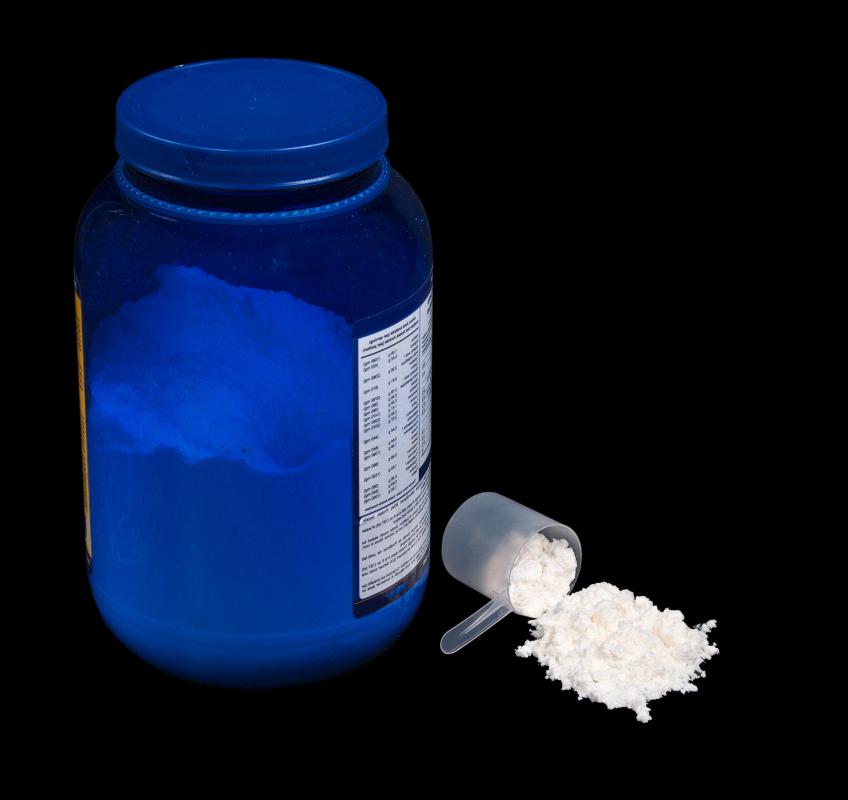At WiseGEEK, we're committed to delivering accurate, trustworthy information. Our expert-authored content is rigorously fact-checked and sourced from credible authorities. Discover how we uphold the highest standards in providing you with reliable knowledge.
How Do I Choose the Best Amino Supplements?
Choosing an amino supplement can be challenging in part because of how many different products are available in most places, as well as the different formats and core ingredients in each. It’s important to note at the outset that most people don’t actually need an amino supplement to thrive or reach optimal health, and in some cases taking them — particularly taking them in high doses for a long time — can actually be harmful. For those with specific medical conditions or athletes with particular muscle growth goals, though, these sorts of supplements can be very beneficial. One of the first things to think about is whether you want essential amino acids, non-essential amino acids, or both. This will probably take a bit of research, and usually depends on the results you’re trying to achieve. You’ll also want to think about the format, since supplements are often available as liquids, powders, or combined into nutritive snacks. Finding what’s best for you may take a bit of experimentation.
Supplementation Basics

Amino acids are sometimes called the “building blocks of life,” and on a basic level they’re protein strands that can help the body with numerous different functions. There are hundreds of known strands. Many are made directly by the human body, but others are required to be absorbed through the diet. Supplements are often made of acids from multiple categories, and are often sold with promises of helping people achieve some discreet health benefit. They’re usually available over the counter, usually from health food stores or suppliers.

There are a variety of reasons why people may turn to amino supplements. People suffering from mental illness, addiction, or immune deficiencies are often directed to these products if they aren't getting a proper amount in their normal diet. Bodybuilders, however, are perhaps most common client group. Individuals in the bodybuilding community frequently want extra amino acids because they hope the excess will help repair and further develop muscles faster than exercising alone. There is some debate within the medical community when it comes to whether or not this works, particularly over the long term, but the practice is nevertheless quite popular.
Think About the Ingredients

Usually, supplements are taken to get more of what are known as essential amino acids, also known as indispensable amino acids. The body cannot synthesize thes naturally, so they must be taken in from food or supplements. Most people who eat a balanced diet get enough for optimal health. If you know you’re deficient in one or two specifically, it’s important to look for supplements that contain these. The eight essential amino acids are isoleucine, leucine, lysine, methionine, phenylalanine, threonine, tryptophan and valine.
Since the body can produce non-essential amino acids from essential amino acids, there usually isn't a reason to take a supplement that contains non-essential amino acids. Sometimes non-essential amino acids are needed, however, and which supplement is best for you should include the particular non-essential amino acid or acids you need. There is some dispute over the number of non-essential amino acids but there are eleven different non-essential amino acids that are most commonly cited in the dietary supplement context: alanine, arginine, asparagine, aspartic acid, cysteine, glutamic acid, glutamine, glycine, proline, serine, and tyrosine. Each serves a different purpose. Arginine, cysteine, and thyrosine are said to help with metabolism, weight loss, and fat burning, for example.
Choose the Right Format
Another consideration when choosing amino acid supplements is its form. There are usually a lot of options, from liquids to powders to capsules. Some power bars or energy bars are good sources of amino acids, too. How you prefer to consume your supplements may be a factor in your selection.
Risks and Precautions
Since the body is dependent upon cellular growth and development, proteins such as amino acids are pivotal. Still, like most things in life, amino acids seem to be subject to the old adage that there is such a thing as too much of a good thing. While research is not conclusive on the issue, most health care professionals caution against an excessive intake of amino acids as it may cause such problems as kidney or liver malfunction or metabolism disruption. If you're considering an amino supplement, you may want to consult a health care professional first to understand your personalized risks and possible benefits.
AS FEATURED ON:
AS FEATURED ON:













Discussion Comments
Some great products that I just discovered from a friend of mine are called Amino Repair and Amino Hydrate.
The Amino Hydrate is perfect for my kids and husband who get super thirsty after a soccer game or basketball and it's better than Gatorade. Amino Hydrate has collagen and electrolytes that help quench their thirst and stay hydrated.
Post your comments